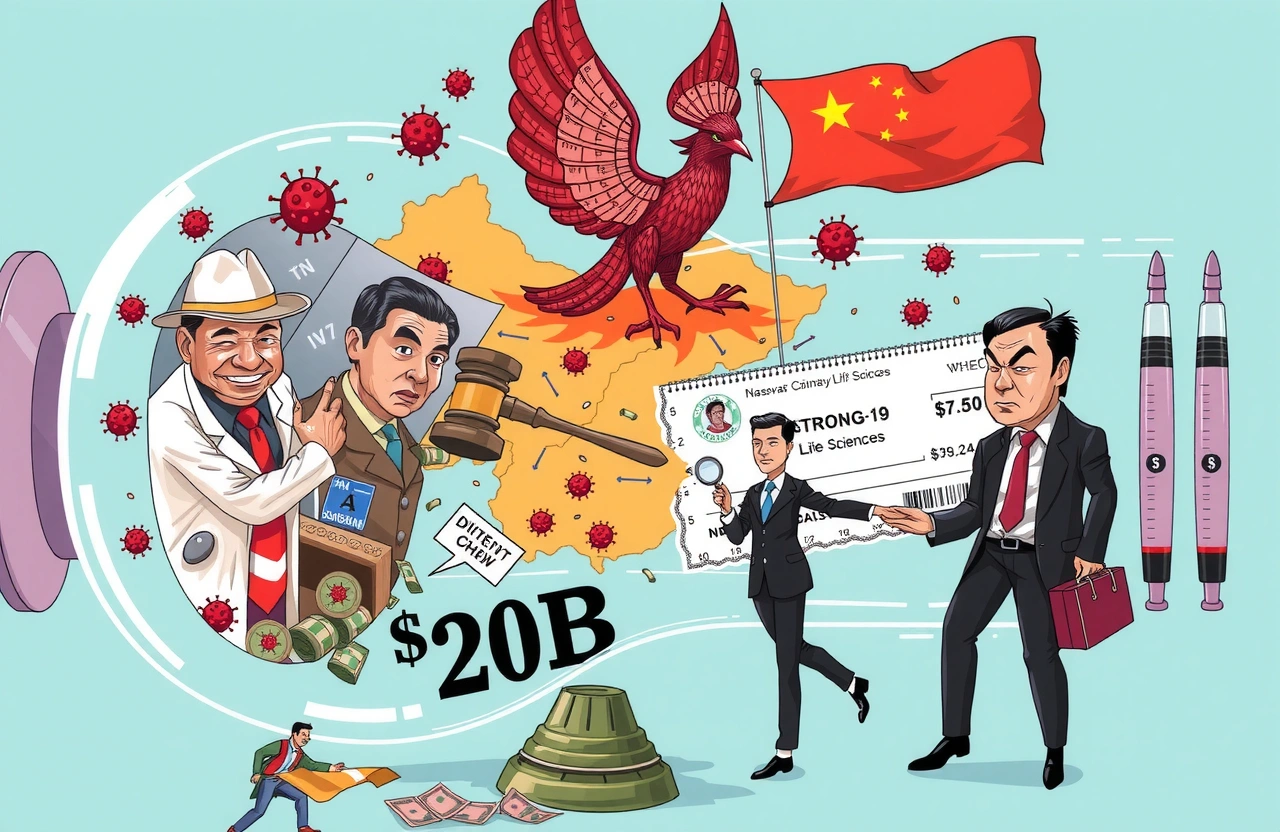The Corporate War Behind China’s Vaccine Giant
The remarkable saga of Sinovac Biotech reveals the hidden conflicts beneath China’s vaccine success story. What began in 1998 as a partnership between a provincial virologist and university investors evolved into cut-throat corporate warfare amidst unprecedented pandemic profits. Yin Weidong’s scientific breakthroughs made Sinovac a household name during COVID-19—while Pan Aihua fought aggressively to maintain control through courtroom battles and factory takeovers. The emergence of Strongnew Capital orchestrated by Li Jiaqiang added complex international dimensions to the conflict, culminating in a world-record $7.5 billion dividend payment that shocked Wall Street.
Key takeaways:
- Sinovac’s COVID vaccine sales exceeded $20 billion despite prolonged shareholder disputes disrupting governance
- A stealthy decades-long stock accumulation strategy gave Strongnew Capital decisive voting power
- Chinese courts issued contradictory rulings about board control amid physical plant takeovers
- The proposed dividend exceeds Sinovac’s share price 850% and represents 70% of cash reserves
- Corporate governance failures led to Nasdaq suspension since 2019 despite massive profits
Founding Myths Collide With Corporate Power Plays
Originating in Tangshan in 1985 with hepatitis A research, Yin Weidong built Sinovac’s backbone before Beijing connections elevated its reach. His partnership with Peking University biotech pioneer Pan Aihua began as mentorship but deteriorated into personal hostility:
The Unraveling Partnership
- 1993: Established Tangshan Yian Biotech with Singaporean funding
- 1998: Received critical 5 million yuan loan from Pan Aihua for final clinical trials
- 2001: Founded Beijing Sinovac Biotech jointly with Peking University team
Financial disagreements surfaced early despite Pan Aihua securing Nasdaq listing via shell company Sinovac Biotechnology. Previously unpublished board minutes reveal Pan believing Sinovac Biotech was his legal creation while Yin considered himself the scientific driver—a disconnect embedding trouble for decades.
The Opaque Agreements
The secret shareholders agreement written during SARS era stipulated:
- Pan Aihua would remain Sinovac Biotech chairman “permanently”
- Board seats promised to Peking University representatives
- Voting thresholds requiring mutual consent for major decisions
By 2018 Pan would lament this arrangement as “betrayal” when Yin pursued privatization partners.
The Seven-Year Chaos: Lockouts and Secret Ventures
Sinovac’s internal breakdown manifested publicly through sensational incidents:
The Factory Takeover
April 2018 witnessed Pan Aihua physically seizing Beijing production facilities:
- 600,000 vaccine doses destroyed
- Tangshan laboratories padlocked
- Manufacturing halted for 9 days
Former biotech analyst Wang Jinglin notes: “This crossed pharmaceutical ethics lines—those vaccines prevented measles outbreaks affecting millions.”
Shadow Vaccines Operation
While boardroom warfare raged Yin created Sinovac Life Sciences—a separate entity using identical teams/research:
- Headquartered adjacent to Beijing facility at No.39 Shangdi Road
- Sourced identical laboratory staffing
- Applied coronavirus patents bearing similarity index >93%
Sinovac Life Sciences would report $28 billion COVID-era earnings directly bypassing struggling biotech.
Geography of Power: How Global Investors Infiltrated
Strongnew Capital exploited volatility accumulating shares unseen:
The Stock Buildup
Li Jiaqiang’s calculated avoidance of disclosure thresholds:
- 2013-2016: Acquired 22.5% via market purchases
- Family accounts established bypassing shareholder reporting
- After Nasdaq suspension continued London OTC trading acquisitions
Independent audit Global Forensic Partners documented incomplete filings:
- 34% stake controlled through proxies
- Undisclosed Canadian accounts holding shares
- SEC imposed $290,000 fines for disclosure violations
Cash Tsunami Dividends as Weapons
Strongnew Capital’s governance strategy deployed unprecedented payments:
Calculated Cash Extraction
The dividend sequence initiated by new board:
- Phase 1: $55/share payout
- Phase 2 & 3: Maximum $75 billion total distribution
- Payments timed days before shareholder votes
This exceeded Sinovac Biotech’s last reported cash reserves ($42B) by 78% requiring asset liquidation.
Strategic Voting Consequences
As minority shareholders flooded accounts:
- Proxy statements excluded electronic voting options
- Shareholders required physical attendance certifying vaccine status
- Shareholders rejecting management nominees forfeited secondary distributions
Governance analyst Soura Raj cautioned: “This raised global flags about abuse.”
Corporate Warfare Aftermath
The winners cemented positions:
- Li Jiaqiang seated as chairman January 2025
- Pan Aihua imprisoned since February 2024
- Yin Weidong retaining Sinovac Life Sciences authority
The transition showcases vulnerabilities within China’s biomedical governance frameworks according to Peking University economics chair Xu Sitao.
Legacy Beyond Financial Statements
COVID Vaccine revenues exceeding estimates:
- 128 billion yuan generated during pandemic
- 95% subsidized through public healthcare systems
- Profits concentrated among holders beyond Chinese boundaries
This represents international bioethics reconsideration:
- West African Ebola containment approaches
- Pharma patent waivers debate
- WHO vaccine equity complaints since 2022
The dilemma impacts immunization participation. Jiangsu province recorded 13% childhood vaccination declines.
What Every Investor Should Watch
The Sinovac saga reveals enduring corporate vulnerabilities:
- Corporate governance
- Shareholder activism preparedness
- Pandemic windfall allocation ethics
Healthcare businesses face inevitable scrutiny demanding:
- Explicit partnership agreements
- Boardroom conflict resolution protocols
- Emergency revenue governance structures
Monitor continuing fallout through shareholder filings and litigation disclosures occurring monthly as extraordinary payments distribute internationally. Demand board transparency statements whenever biotech companies deploy defensive dividends.



